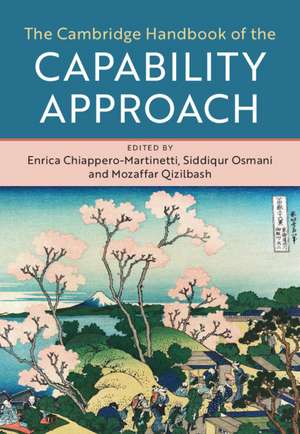The Cambridge Handbook of the Capability Approach
Editat de Enrica Chiappero-Martinetti, Siddiqur Osmani, Mozaffar Qizilbashen Limba Engleză Hardback – 18 noi 2020
Preț: 1016.15 lei
Preț vechi: 1319.67 lei
-23% Nou
Puncte Express: 1524
Preț estimativ în valută:
194.45€ • 207.92$ • 162.12£
194.45€ • 207.92$ • 162.12£
Carte disponibilă
Livrare economică 28 martie-11 aprilie
Preluare comenzi: 021 569.72.76
Specificații
ISBN-13: 9781107115286
ISBN-10: 1107115280
Pagini: 740
Dimensiuni: 177 x 250 x 44 mm
Greutate: 1.41 kg
Editura: Cambridge University Press
Colecția Cambridge University Press
Locul publicării:New York, United States
ISBN-10: 1107115280
Pagini: 740
Dimensiuni: 177 x 250 x 44 mm
Greutate: 1.41 kg
Editura: Cambridge University Press
Colecția Cambridge University Press
Locul publicării:New York, United States
Cuprins
Foreword Amartya Sen; General introduction Enrica Chiappero-Martinetti, Siddiqur Osmani and Mozaffar Qizilbash; Part I. Historical Antecedents and Philosophical Debates: Introduction to Part I Mozaffar Qizilbash; 1. The capabilities approach and the history of philosophy Martha C. Nussbaum; 2. Karl Marx and the capabilities approach David Leopold; 3. Utility and capability: J. S. Mill and Amartya Sen L. Wayne Sumner; 4. Intellectual history and defending the capabilities approach David Weinstein; 5. Sen, Smith and the Cambridge tradition Luigino Bruni; 6. The capability approach to well-being and freedom from the viewpoint of welfare economics and social choice theory Kotaro Suzumura; 7. Resources or capabilities? An introduction to the debate Ilse Oosterlaken; 8. Taking multidimensionality seriously: capabilities, Rawls's primary goods, and guiding action Henry S. Richardson; 9. The capabilities approach and political liberalism Richard Arneson; 10. Selecting a list: the capability approach's Achilles heel Rutger Claassen; 11. Individualism and the capability approach: the role of collectivities in expanding human capabilities Solava Ibrahim; 12. The politics of wonder: the capabilities approach in the context of mass extinction Jeremy Bendik-Keymer; Part II. Methods, Measurement and Empirical Evidence: Introduction to Part II Enrica Chiappero-Martinetti; 13. Social choice and the capability approach Maurice Salles; 14. On capability and its measurement Prasanta K. Pattanaik and Yongsheng Xu; 15. Analyzing capabilities: games, groups and effectivity Martin van Hees; 16. Implementing the capability approach with respect for individual valuations: an illustration with Colombian data Koen Decancq, Erik Schokkaert and Blanca Zuluaga; 17. Capability, opportunity, outcome – and equality Ravi Kanbur; 18. The distribution of capabilities: up, down, sideways and along Tania Burchardt; 19. Inter-group disparities in the distribution of human development: two apparent conundrums and how we might address them Peter J. Lambert and Sreenivasan Subramanian; 20. Multidimensional inequality and human development Suman Seth and Maria Emma Santos; 21. The research agenda on multidimensional poverty measurement: important and as-yet unanswered questions Sabina Alkire; 22. Measuring gender inequality using the capability approach: issues and challenges Stephan Klasen; 23. Econometric and statistical models for operationalising the capability approach Jaya Krishnakumar; 24. Expanding capabilities through participatory action research Alejandra Boni and Alexandre Apsan Frediani; Part III. Issues in Public Policy: Introduction to Part III Siddiqur Osmani; 25. On education and capabilities expansion Melanie Walker; 26. Capability approach to children's well-being and well-becoming Mario Biggeri; 27. Capability and disability Lorella Terzi; 28. Social exclusion and capability development Jonathan Wolff; 29. Human security Des Gasper; 30. Income inequality and human capabilities Rolph van der Hoeven; 31. The capability approach and human rights Polly Vizard; 32. Capabilities and the law Katharine Gelber; 33. Capabilities, public reason and democratic deliberation Jay Drydyk; 34. Entitlements and capabilities Sanjay G. Reddy and Adel Daoud; 35. Religion and the capability approach Séverine Deneulin and Augusto Zampini-Davies.
Recenzii
'Starting with Amartya Sen's seminal 1979 Tanner Lectures, the capabilities approach has come to occupy a major space in economics and philosophy. The handbook's audacious range, covering the subject's historical roots, summarizing econometric techniques to operationalize it, evaluating its inter-connection with traditional welfare economics, and also to the mysteries of nature and the role of wonder - make it an intellectual feast. I have no doubt that the book will become the most important compendium on the subject.' Kaushik Basu, Cornell University
'This volume situates the capability approach to justice historically and philosophically, provides a record of its achievements in modeling and measuring a vital aspect of human flourishing, and identifies a continuing program of promising research and reflection. Looking back and looking forward, it is an essential handbook for novices and experts alike.' Philip Pettit, Princeton University & Australian National University
'Understanding the capability approach is a great challenge, given the wide range of disciplines and debates involved. This handbook will greatly help those taking up that challenge. It includes chapters on the historical roots of the capability approach, philosophical debates, questions of measurement and evaluation, and questions of public policy and social concerns. This major contribution will be required reading for all students and scholars of the capability approach.' Ingrid Robeyns, Utrecht University
'This volume situates the capability approach to justice historically and philosophically, provides a record of its achievements in modeling and measuring a vital aspect of human flourishing, and identifies a continuing program of promising research and reflection. Looking back and looking forward, it is an essential handbook for novices and experts alike.' Philip Pettit, Princeton University & Australian National University
'Understanding the capability approach is a great challenge, given the wide range of disciplines and debates involved. This handbook will greatly help those taking up that challenge. It includes chapters on the historical roots of the capability approach, philosophical debates, questions of measurement and evaluation, and questions of public policy and social concerns. This major contribution will be required reading for all students and scholars of the capability approach.' Ingrid Robeyns, Utrecht University
Descriere
This landmark handbook explores cutting-edge research on the capability approach pioneered by Amartya Sen and Martha C. Nussbaum.
